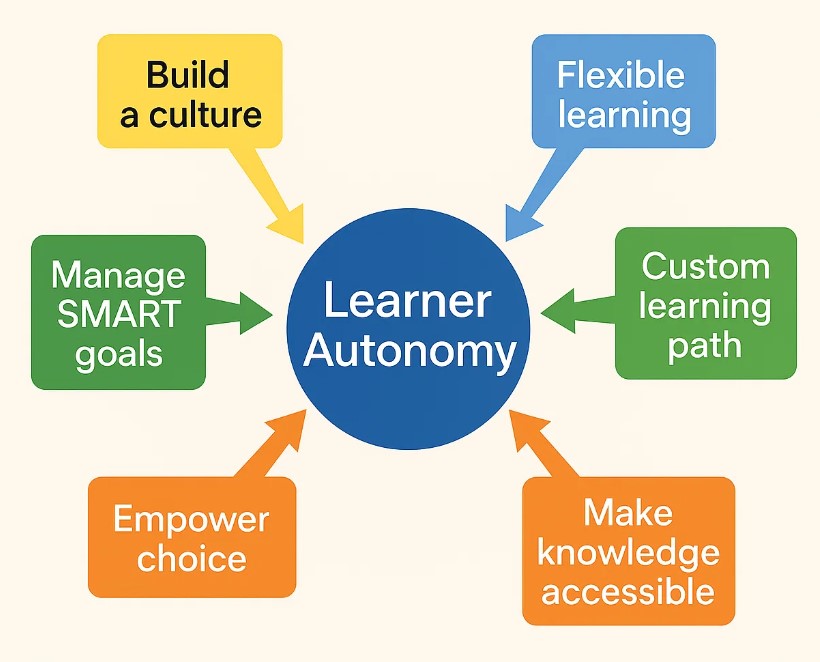The modern workforce is changing—and so are expectations around workplace learning. Today’s employees are no longer satisfied with one-size-fits-all training. They seek greater freedom, flexibility, and control over how they build their skills.
A recent study found that 74% of younger employees are likely to leave their jobs within a year if they don’t see meaningful development opportunities. For organisations, this presents both a challenge and an opportunity: invest in better learning systems or risk losing top talent.
One of the most powerful responses to this shift is the concept of learner autonomy—giving employees the space and tools to direct their own learning journeys. And with platforms like Beetsol LMS, enabling this autonomy is easier than ever.
What is Learner Autonomy?

Learner autonomy refers to an individual’s ability and willingness to take charge of their own learning journey. This involves setting personal learning goals, identifying suitable resources, choosing learning methods and timelines, and regularly evaluating progress. It’s about being self-directed and proactive rather than relying solely on top-down instruction or rigid training modules. The concept, introduced by Henri Holec in the 1980s, emphasises giving learners control to increase motivation, accountability, and effectiveness.
Autonomous learners are not isolated; they may still engage with trainers, peers, and managers, but they do so on their own terms, taking initiative to seek help or collaborate. This approach encourages a mindset of continuous development and self-improvement—key traits in today’s fast-evolving professional environments.
Why Learner Autonomy Matters Today?
In today’s dynamic work culture, skills become outdated quickly, and job roles are constantly evolving. Employees, especially from younger professionals, expect meaningful learning opportunities that help them stay relevant and advance in their careers. Studies show that a lack of such opportunities is a major reason why younger professionals leave organisations.
Learner autonomy addresses this by empowering individuals to drive their own learning, making it more personalized, relevant, and timely. This not only boosts engagement and retention but also helps businesses build a workforce that is adaptable, skilled, and future-ready. By fostering a culture of self-directed learning, organizations can ensure long-term growth and resilience in a competitive landscape.
Benefits of Learner Autonomy
Implementing learner autonomy in the workplace provides several tangible benefits for both employees and organisations:
Increased Motivation and Engagement
When employees are trusted to direct their own learning, they feel more valued and invested in the process. This sense of ownership fosters a deeper commitment to learning and applying new skills.
Faster Skill Acquisition and Adaptability
Autonomous learners tend to identify skill gaps early and proactively fill them. This helps organisations stay ahead in fast-changing industries and reduces the lag between learning and on-the-job performance.
Boost Retention by Empowering Growth
When employees feel supported in their professional development and have the freedom to shape their learning journey, they’re more likely to stay committed to the organisation. This not only reduces turnover but also enhances overall job satisfaction and loyalty.
Stronger Culture of Innovation
When employees continuously pursue learning that aligns with their passions and roles, they’re more likely to bring fresh perspectives and innovative ideas into their teams and projects.
Why Companies Are Shifting from Top-Down to Employee-Led Learning
Traditional, top-down learning models often focus on compliance or general skills. While still important, this approach can be limiting. It doesn’t account for individual learning needs, career goals, or preferred learning styles.
With younger generations entering the workforce, there’s a clear preference for personalised, self-paced, and relevant learning. That’s why many organisations are now moving toward employee-led development models, where learner choose what, when, and how to learn—within a structured, supportive framework.
This shift not only improves engagement but also enhances knowledge retention and real-world application. When learners take charge, they’re more invested in the outcomes. And with the right tools in place, companies can still maintain oversight and alignment with business goals.
Steps to Boost Learner Autonomy in Your Organization

1. Make Knowledge Instantly Accessible
Beetsol LMS ensures that knowledge is always within reach—just a click away. Designed with modern learners in mind, it empowers employees to access training material anytime, anywhere, and tailor their learning journey based on their individual pace, preferences, and goals. Whether it’s a quick refresher before a meeting or in-depth exploration of a new skill, Beetsol’s intuitive platform supports flexible, personalised learning that fits seamlessly into the workday.
2. Build a Culture Where Learning Feels Safe and Valued
Creating psychological safety is step one. At Beetsol, our LMS allows HR teams to build “learning zones” where employees can explore without judgment. Team leaders should act as mentors—not micromanagers—and use built-in tools like discussion boards or coaching sessions to keep things human.
3. Give Employees Access to On-Demand, Flexible Learning
Beetsol LMS offers mobile learning, micro-courses, and asynchronous formats. This flexibility empowers learners to engage at their own pace—on their terms—without sacrificing productivity. Our AI also suggests bite-sized content that fits into their daily workflow.
4. Let Learners Customise Their Path with Smart Guidance
Don’t just offer content—offer direction. With Beetsol, admins can set company-wide objectives while allowing users to personalize their journey. Our platform auto-generates learning paths based on role, interests, or past performance.
5. Teach Goal-Setting & Track Progress with Built-In Tools
Encourage learners to set and manage their own SMART goals within Beetsol LMS. Our visual dashboards help them see their own growth, nudging them to reflect and re-align. Optional reminders and nudges can be set to support consistency.
6. Empower Choice: Formats, Assignments, & Feedback
Beetsol allows users to choose how they demonstrate progress—whether via quizzes, projects, peer reviews, or video submissions. You can also enable multiple content formats (text, video, podcast), giving learners autonomy in how they consume knowledge.
How Beetsol LMS Empowers Autonomous Learners
Beetsol LMS has been built with learner autonomy in mind. It goes beyond content delivery to offer a dynamic, flexible, and AI-powered experience that adapts to each learner’s journey.
Key features that support autonomy include:
- Flexible Modules: Learners can access content anytime, anywhere—perfect for different schedules and learning styles.
- AI-Powered Recommendations: Beetsol uses artificial intelligence to suggest relevant courses based on a user’s role, goals, and past activity.
- Custom Learning Paths: Employees can create their own paths aligned with personal development plans or career progression.
- Progress Tracking and Self-Evaluation: Built-in analytics allow learners to monitor their progress and stay motivated.
- Mobile Learning Access: Beetsol supports fully mobile learning, allowing users to continue their development journey from any device, anytime—ideal for a flexible, autonomous learning experience.
These features not only encourage independence but also ensure that employees stay aligned with company objectives.
Practical Strategies for HR and L&D Teams
- Set Clear Learning Goals Together: Use Beetsol’s goal-setting tools to help employees align their learning with both personal and organisational objectives.
- Encourage Exploration: Let learners browse a wide range of topics and modules to find what excites them.
- Leverage AI Recommendations: Promote personalised suggestions as a way to discover new skills and training opportunities.
- Encourage Self-Reflection: Incorporate prompts, journals, or progress check-ins within the LMS that encourage learners to reflect on what they’ve learned, how they’ve applied it, and where they want to grow next.
- Monitor & Support, Not Control: Use analytics to identify when learners may need guidance—but let them lead their path.
Put Learners in Control—Equip Them for Success
In today’s fast-changing business environment, empowering employees to drive their own development is more than a trend—it’s a necessity. Learner autonomy boosts engagement, retention, and performance, while reducing the burden on HR and L&D teams.
With Beetsol LMS, organisations can provide a platform that respects individuality while maintaining structured, goal-aligned learning. If you’re ready to make the shift to a more modern, learner-centred training model—request a free demo of Beetsol LMS today.
